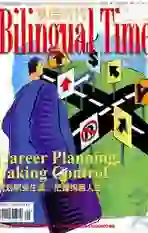经济危机是追逐职业梦想的良机吗?
2009-11-11PamelaSlim
Pamela Slim
For a long time, I thought it was totally normal to hear people's deepest creative desires within five minutes of meeting them. Having picked up a prescription at our local grocery store, I told my husband that our new pharmacist longed to be a poet. 'How in the world do you find these things out?' he asked. 'I don't know; I just sense they have a story to tell.'
长久以来,我认为在见面的前五分钟就可以听到人们心灵深处充满想象力的愿望。去地方一家小卖部拿了处方回来后,我告诉丈夫说,新来的药剂师希望成为一名诗人。“你怎么会知道?”他问。“我不知道;我只是感觉他们有故事要讲。”

Interest in people, and my curiosity about what keeps them from realizing their dreams, drove me to become a business coach 13 years ago. I love hearing people's stories, and helping the creatively oppressed come alive. Crumbling markets, huge layoffs and widespread financial panic have unleashed a giant wave of creative yearnings. People from all walks of life are realizing the best time to reinvent their careers is now.
13年前,由于对人感兴趣,且好奇于什么让他们实现自己的梦想,我成了一个商业教练。我喜欢聆听人们的故事,帮助他们唤醒被压制的创造力。市场分崩离析,大规模的裁员,金融恐慌四处蔓延,创造渴望却因此得到释放。各行各业的人都意识到,经济动荡时刻成了再造职业的绝佳机会。
I asked a random sampling of my Twitter followers in 'stable' work situations, what they fantasized about doing for a living. One of them said, 'I'm an online education program administrator and I want to start a church.' Perhaps my favorite was the successful entrepreneur who fantasized about being a United Parcel Service driver. Besides the brown shorts, what made him want to pursue that? 'Order, consistency, time to think, exercise, fresh air: basically everything I pine for lost in my agency's mayhem.'
我在Twitter我的好友中随意抽取了一些工作“稳定”的人,问他们对于工作有什么幻想。
其中一人说:“我是一名网络教育项目的负责人,我想创办一座教堂。”我最喜欢的可能要数一名成功的企业家,他梦想成为UPS快递公司的一名司机。除了粗茶淡饭,是什么使他想这样做呢?“工作有条不紊,有时间思考、锻炼,可以呼吸新鲜空气,这些都是我在深渊般的办公室里所渴望得到的。”
So why do so many of us perceive ourselves as being so terribly mis aligned with our profession? Upbringing can have something to do with it. A client once confessed: 'My father told me I had three career options. I could be a doctor, an engineer or a failure.' I imagine that when the Grammy-winning singer John Legend broke the news that he wanted to quit his job as a management consultant to pursue music full time, some of his relatives were concerned. Obviously, he made the right choice. Many stories don't turn out that way.
为什么我们当中有这么多人觉得自己与正确的工作严重错位呢?这可能跟家庭教育有点关系。一名客户曾经承认:“我父亲说我有三种职业选择。我可以是医生、工程师,或者一事无成。”我猜想,当格莱美奖获得者、歌手约翰•莱金透露自己想辞去波士顿咨询公司业务顾问的工作,全职从事音乐时,他的一些亲戚会对此表示忧虑。显然,他做出了正确的选择。但许多故事的结局却并非如此。
What separates crazy dreams from viable business ideas? I don't think it has anything to do with the idea, or the profession, or the market itself. It has to do with the person. Jonathan Fields, a high-powered Wall Street lawyer, quit his job more than a decade ago to do personal training sessions in Central Park for $15 an hour. He turned his passion into one of the most profitable fitness centers in New York. He then founded a flourishing yoga studio, which he sold after getting a deal from a major publishing house to write a career guide. Real creative urges, those we are meant to express, don't go away. If ignored, they bother us, affect our health, fester and eventually turn us into the living dead.
妄想与可行的商业想法区别之处在哪里呢?我觉得与想法、职业、市场都无关,而是在于个人。华尔街大律师乔纳森•菲尔兹十几年前辞职,在中央公园开展个人培训,每小时收费15美元。之后他又投入饱满的激情创办了纽约最赚钱的健身中心之一。后来,他还开办了一家瑜伽会馆,生意兴隆。在得到一家大出版社的合同,写一本有关职业指导的书之后,他又将瑜伽会馆出售。我们想表达出来的真正的创造愿望不会消失。如果被忽视,它们会搅扰我们,影响我们的健康,令我们烦恼,最终将我们变成行尸走肉。
There are many ways though to deal with our creative aspirations, as I learned from Anne Nelson. Ms. Nelson left a successful career as a pharmaceutical sales representative when, she said, she realized that her job selling animal antibiotics conflicted with her values. She started down a path of 'self-accuratizing', her term for finding a career that would make her happy. Her first stop was a decorative wall-finishing business, a nod to her study of art in college. Three years later, after spending three days perched on scaffolding painting a living room, she realized that she didn't want to be doing that when she was 55, and quit the business.
对待我们创造志向的方法很多,这是安妮•尼尔森教会我的。尼尔森曾经是一名成功的药品销售代表,她表示,自己后来意识到销售动物抗生素与其个人价值相抵触。于是她开始了“寻找个人潜能”之路,寻找一种令她快乐的职业。她首先做起了墙壁装修生意,这正与自己大学的艺术专业对口。三年后,她为了粉刷一间客厅而在脚手架上呆了三天,之后她意识到,自己不愿在55岁的时候还这样,因此她放弃了做这个。
In Mexico she spent time, 'learning through simple, conscious living, what joy really feels like.' She took up ballroom dancing. She completed an M.B.A. in sustainability. Now she uses visual mapping to help businesses with their conceptual planning; combining her interests: Experience in art, business and using her hands. 'Some people may call me flaky, but I don't really care. I have never been happier,' she said. 'If a situation does not work for me anymore, I leave. My energy is high, I wake up with joy, and I feel alive.'
她呆在墨西哥,“在简单而清醒的生活中,理解快乐究竟是什么感觉。”她学会了交际舞。完成了可持续发展MBA学位。现在她使用虚拟制图给公司做概念规划;结合了她的兴趣:既有从事艺术和经商的经验,还可以动手。“可能会有人说我怪异,但我真的不在乎。我从未如此快乐过,”她说。“如果我不再喜欢这样的状况了,我就离开。我精力充沛,每天在快乐中醒来,感到朝气蓬勃。”
In this time of economic chaos, people may be inspired by Ms. Nelson's story. Whilst already living with uncertainty, and working like crazy to secure their livelihoods, they might as well pursue something they care deeply about. We may start new businesses and find successful new careers. We will certainly have failed plans, disappointments and broken dreams. But mostly, we will all benefit from the huge blast of creative energy unleashed by people finally pursuing the work that is the best fit for them.
值此经济动荡时期,人们可能会受到尼尔森故事的激励。生活已经充满不确定因素,与其说疯狂地工作以保住饭碗,不如做些自己最想做的事。我们可以创业,重新找到成功的职业。我们肯定会遭遇到计划失败,失落,梦想破碎。但最重要的是,我们在追求最适合自己的工作时所释放出来的巨大能量将使我们受益匪浅。
